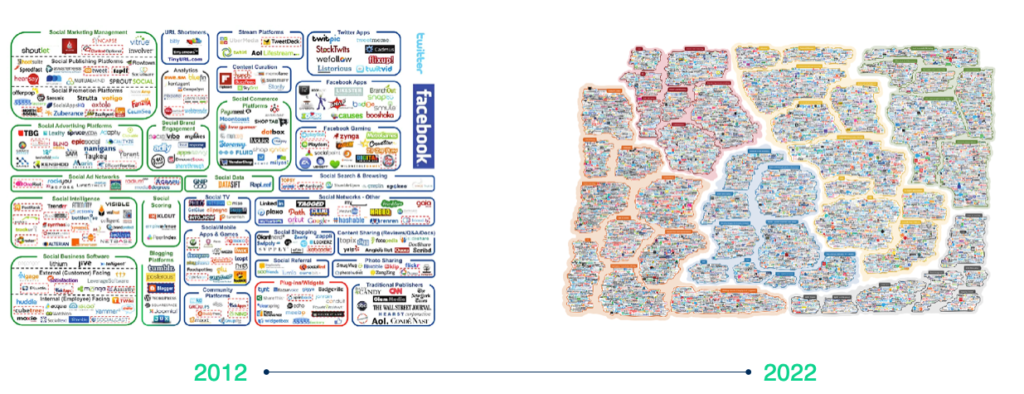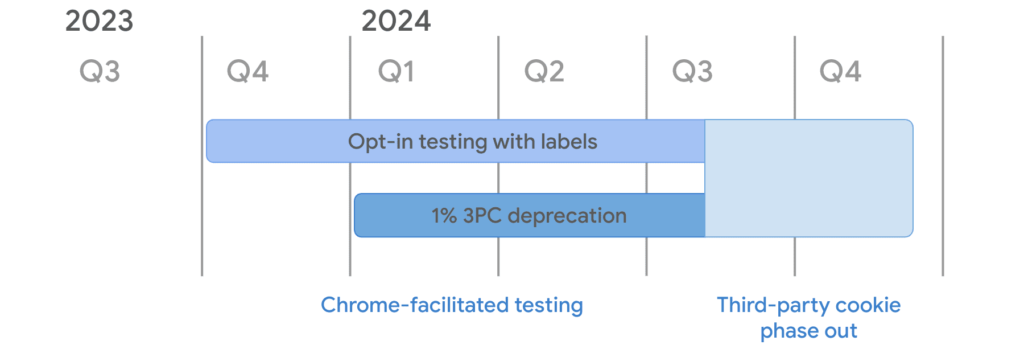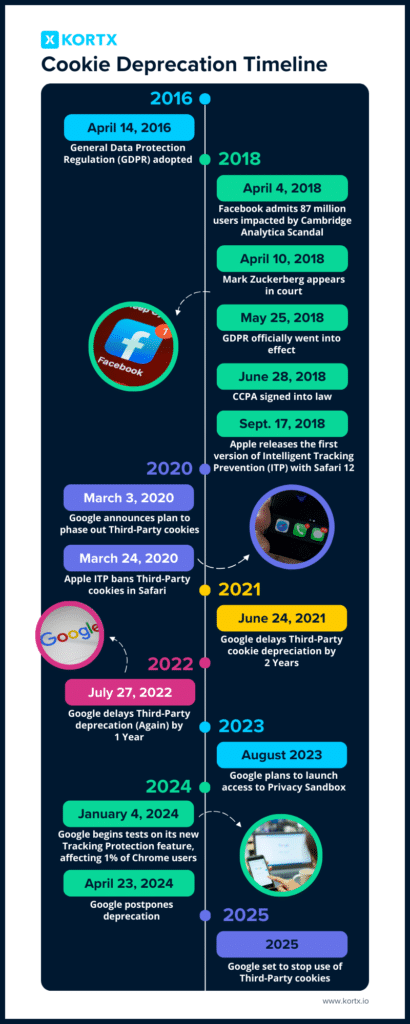Experiences refined for people
Experiences refined for people
After delaying its deadline twice, Google announced on Apr 23, 2024 it will push the Third-Party cookie deprecation deadline again, even after promising it wouldn’t.
Although Google’s cookie deprecation is still some time away, it’s wise to future-proof your strategy to avoid relying on Third-Party cookies.
Review our countdown to a cookieless future timeline so your marketing campaigns are fully prepared for this new era (whenever it comes).
Tracking cookies fueled digital media’s exponential growth over the past decade. This access to user data enabled numerous websites, social media networks, and online shopping services to become popular.

In May 2018, data privacy became a concern when the EU introduced the GDPR (Global Data Protection Regulation). This government regulation limits how user data can be used and sets requirements for consent around this data.
Following this, a similar law arose in the United States. California enacted the CCPA (California Consumer Privacy Act) in 2020. The CCPA provides consumers more control over how companies and brands use their private data.
Some browsers and companies like Safari (Apple) and Firefox have already limited cookies, while others like Google have been slower to respond.
Chrome aims to extend Third-Party cookie restrictions to all users by Q3 2024, pending the resolution of the UK Competition and Markets Authority‘s concerns.
What are the differences between GDPR and CCPA?
GDPR requires explicit consent to sell personal data, and the fines for non-compliance are higher. GDPR can fine up to 4% of a company’s global revenue, whereas CCPA charges $7,500 for each infraction.
Privacy Sandbox is an ongoing Google initiative aiming to standardize and strengthen online user privacy while enabling marketers to deliver and measure personalized ads.
A central (and controversial) component of Privacy Sandbox involves the phasing out Third-Party cookies, a technology the ad industry relies on to track and gather user behaviors across websites anonymously.

Google’s original Privacy Sandbox timeline has since been taken down.
In February 2024, the UK Competition and Markets Authority (CMA) ordered Google to pause Third-Party cookie phaseout until it addressed anti-competitive concerns.
The Privacy Sandbox ad auction uses the outcomes of one auction to inform the next. According to some industry leaders, including publishers and tech companies, this process overlooks the conventional functions of ad servers and supply-side platforms, potentially solidifying Google’s dominance in the market.
The IAB Tech Lab’s Privacy Sandbox Task Force noted that the APIs available in the Privacy Sandbox do not support many fundamental digital advertising use cases.
For example, the Protected Audience API (PAAPI) calculates bids for specific interest groups, which can unintentionally lead to advertisers competing against themselves.
Early tests have shown that this API tends to result in higher latency (meaning ads load more slowly) and reduced revenue.
To further complicate matters, the PAAPI relies on intermediaries called Trusted Execution Environments to process and secure the data involved in generating advertising bids.
Currently, the only two providers of these environments are Google and Amazon.
Concerns have been escalating for some time. Google has recently recognized the need for additional time to build consensus among regulators, developers, and advertising executives, or at least to secure the approval of a single regulator to proceed.
For now, there isn’t a set timeline for cookie deprecation, but that doesn’t mean brands shouldn’t prepare.
Why haven’t more advertisers made the jump to test 3P free solutions?
“As advertisers, we’ve been blessed (and perhaps cursed) with endless taxonomies, metrics, and tracking options. With this wealth of data, there have been years of fine-tuning to attract and convert new customers and, maybe more importantly, defend market share. Given the pressure on CMOs for short-term return on investment, diverting funds from proven initiatives to test for the uncertain future is an increasingly difficult decision to stamp their name on. Especially knowing the average tenure of CMOs is just 40 months.”

The deprecation of Third-Party cookies aligns closely with regulations (US and beyond) and changes made for specific brands and browsers.

April 14, 2016: GDPR adopted
April 4, 2018: Facebook admits 87 million users impacted by Cambridge Analytica Scandal
April 10, 2018: Mark Zuckerberg appears in court
May 25, 2018: GDPR officially went into effect
June 28, 2018: CCPA signed into law
September 17, 2018: Apple releases the first version of Intelligent Tracking Prevention (ITP) with Safari 12
September 3, 2019: Firefox rolls out default 3P cookie ban
March 3, 2020: Google announces plan to phase-out Third-Party cookies
March 24, 2020: Apple ITP bans Third-Party cookies in Safari
June 24, 2021: Google delays Third-Party cookie depreciation by 1 year
July 27, 2022: Google delays Third-Party deprecation (Again) by 2 years
August 2023: Google plans to launch access to Privacy Sandbox
January 4, 2024: Google begins tests on its new Tracking Protection feature, affecting 1% of Chrome users
Q2 2024: Google halted Third-Party Cookie phaseout
2025: Google set to stop the use of Third-Party cookies
Source(s):
Facebook says 87 million people’s data was taken in the Cambridge Analytica scandal — far more than previously thought, Insider
Google Delays The End Of Third-Party Cookies (Again), From 2023 To The End Of 2024, AdExchanger
The Privacy Sandbox Timeline for the Web, Privacy Sandbox
A Timeline of Apple’s Privacy Changes in Safari and iOS [infographic], Clearcode
What do brands miss by relying on Third-Party cookies?
“Relying solely on Third-Party targeting can mean missing entire audiences that would otherwise engage with your brand, and indicates a lack of readiness to evolve audience-centric targeting strategies. The tremendous advancements in programmatic advertising have downplayed the value of market research and audience strategy. Now, is the time for marketers to revisit these key concepts as the convenience of behavioral advertising shifts.”

The phase-out of Third-Party cookies marks a historic shift in data privacy in 2024. Brands must proactively adapt to this change, moving away from reliance on Third-Party data towards more privacy-centric strategies. Marketers can anticipate these shifts and change their targeting approach by staying informed about the cookieless future timeline.
Our expert team can help you prepare for the cookieless future with many cookieless options suited to your brand, including ID-free targeting, AI-powered contextual marketing, & more.
Kate Meda is a Copywriter at KORTX. She enjoys omitting needless words and making things sound good.
From us to your inbox weekly.